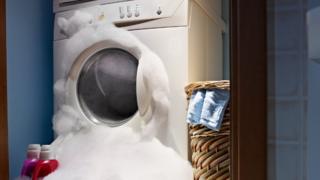Climate change: ‘Right to repair’ gathers force
 Image copyright
Image copyright
Getty Images
It is frustrating: you buy a new appliance then just after the warranty runs out, it gives up the ghost.
You can’t repair it and can’t find anyone else to at a decent price, so it joins the global mountain of junk.
You’re forced to buy a replacement, which fuels climate change from the greenhouse gases released in the manufacturing process.
But help is at hand, because citizens in the EU and parts of the USA will soon get a “right to repair” – of sorts.
This consists of a series of proposals from European environment ministers to force manufacturers to make goods that last longer and are easier to mend.
The European proposals refer to lighting, televisions and large home appliances.
At least 18 US states are considering similar laws in a growing backlash against products which can’t be prised apart because they’re glued together, or which don’t have a supply of spare parts, or repair instructions.
How will the Right to Repair happen?
European environment ministers have a series of proposals forcing manufacturers to make goods that last longer and are easier to mend. The European proposals refer to lighting, televisions and large home appliances.
Plans for the EU Ecodesign Directive are complex and controversial. Manufacturers say the proposed rules on repairability are too strict and will stifle innovation.
Consumer campaigners complain the EU Commission has allowed firms to keep control of the repair process by insisting some products are mended by professionals under the control of manufacturers.
The European Environmental Bureau (EEB) said: “This restricts the access of independent repairers to spare parts and information – and that limits the scope and affordability of repair services.” The EEB also wants other products like smart phones and printers included in the legislation.
How will it help the environment?
Green groups say legislation under way in Europe and the US represents progress towards saving carbon emissions and using resources more wisely.
Libby Peake from the think tank Green Alliance told BBC News: “The new rules are a definite improvement. We think they could have been better, but it’s good news that at last politicians are waking up to an issue that the public have recognised as a problem for a long time. The new rules will benefit the environment and save resources.”
What has driven the changes?
The policies have been driven by some arresting statistics.
- One study showed that between 2004 and 2012, the proportion of major household appliances that died within five years rose from 3.5% to 8.3%.
- An analysis of junked washing machines at a recycling centre showed that more than 10% were less than five years old.
- Another study estimates that because of the CO2 emitted in the manufacturing process, a long-lasting washing machine will generate over two decades 1.1 tonnes less CO2 than a short-lived model.
- Many lamps sold in Europe come with individual light bulbs that can’t be replaced. So when one bulb packs in, the whole lamp has to be jettisoned.
Isn’t it better to scrap an old appliance and buy a more efficient one?
This is no simple question. Resource analysts say, as a rule of thumb, if your current appliance is old and has a very low energy efficiency rating, it can sometimes be better in terms of lifetime CO2 emissions to replace it with a new model rated A or AA. In most other cases it produces fewer emissions sticking with the old model.
There’s another debate about how readily consumers should be allowed to mend appliances. The Right to Repair movement wants products that can be fully disassembled and repaired with spare parts and advice supplied by the manufacturer.
Some manufacturers fear that bungling DIY repairers will damage the machines they’re trying to fix, and potentially render them dangerous.
One industry group, Digital Europe, said: “We understand the political ambition to integrate strict energy and resource efficiency aspects in Ecodesign, but we are concerned that some requirements are either unrealistic or provide no added value.
“The draft regulations limit market access, deviate from internationally-recognised best practices and compromise intellectual property.”
What should I do with my broken kettle?
Will UK have to stick to the new standards after Brexit?
The British government has welcomed the new rules and will almost certainly need to replicate them if UK firms are to export to Europe.
Environment Minister Thérèse Coffey told BBC News resource efficiency was “key to improving our productivity and making best use of precious resources”.
“That is why we are supporting measures in the new Ecodesign Directive product regulations to encourage repair and re-use of a range of products.”
This is a very different tone from the one adopted by critics of the EU’s previous initiatives on energy efficiency.
There were warnings that forcing vacuum cleaners to use less power would leave Britain’s floors dirty.
It transpired that the rules had forced manufacturers to make new cleaners that cleaned equally well – but using less power, thanks to better floorhead design.
Follow Roger on Twitter @rharrabin
Have you successfully had an electrical item repaired? Tell us about your experiences by emailing haveyoursay@bbc.co.uk
Please include a contact number if you are willing to speak to a BBC journalist. You can also contact us in the following ways:
- WhatsApp: +44 7555 173285
- Tweet: @BBC_HaveYourSay
- Send pictures/video to yourpics@bbc.co.uk
- Upload your pictures / video here
- Text an SMS or MMS to 61124 or +44 7624 800 100
- Please read our terms & conditions and privacy policy



